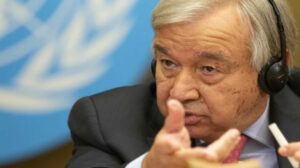
This autumn, the European Union faces some very serious challenges.
The EU’s biggest problem starting in autumn will be the rising cost and shortage of natural gas. It will be particularly detrimental to Germany and Northern Italy which are the two main manufacturing hubs in western Europe. These hubs have suffered hard from the Chinese recession, which has resulted in them losing export markets.
Since childhood, I believed that without Germany there would not be an EU. Germany is the financial backstop that allows all of the EU’s ambitious plans to be realized, including the Green Deal and the newly acquired borrowing capacity. The EU would crumble without a strong German economy and a Germany that cares about its neighbours as much as it does itself. It is vital that all EU countries show energy solidarity with Germany in this winter and autumn, when the EU’s economic model is particularly stressed.
The EU faces other threats beyond the German economic crisis. One is from Poland and the other is from the UK.
Poland’s not-so independent judiciary
The Polish courts system has been politicized to serve the interests of the ruling Law and Justice Party. Polish courts are now rejecting the EU’s primacy over Polish law in disputes relating to issues within the EU’s scope of competence under the treaties.
This principle of EU law’s primacy, which is to be authoritatively interpreted and enforced by the European Court of Justice (ECJ), is not new. It dates back to 1964 and 1970 European Court of Justice (ECJ), decisions. We have created a single market that is consistent with EU law by having a single interpreter, the ECJ. This has been more or less universally applied across all 27 EU countries.
A disciplinary tribunal was established by the Polish government to oversee judges’ independence. Some judges were fired because they were not liked by the government. These actions encourage a nationalistic, eurosceptic interpretation about the EU’s position on Polish law.
As is the norm in many EU countries, cases relating to the interpretation of EU laws as they are applied in Poland are not being referred directly to the ECJ. Slowly, however, the EU law’s primacy in Poland is being eroded. If a large country like Poland is allowed to do this, then other countries, such as Hungary, who are even more eurosceptic than Poland, will also be able to do it and the EU will start to fall apart.
In June 2022, despite Poland’s attempts to undermine the EU, the country received EUR36 billion in EU funds. As required by EU decisions, the country has yet to disband its disciplinary tribunal. The primacy of EU law has not been addressed by Poland.
The European Commission (EC), led by Ursula von der Leyen, voted in a split vote to release the funds. This was on the condition that Poland would achieve certain “milestones,” which include the abolition and affirmation of EU law’s primacy. The burden Poland has borne in helping Ukraine influenced the EC’s decision to release funds. This decision is nevertheless fundamentally detrimental to the EU. Ukrainians are willing to give their lives for the rule of law, which is one of the core values of the EU. It is also the main reason why countries such as Ukraine wish to become full members of the EU.
Prasannkumar is a passionate digital marketer and devoted team leader. He loves trying out and sharing the latest knowledge about industry trends, market growth, and keyword analysis with new google and other search engines algorithm. He effectively knows how content feeds into different subsets of the marketing plan and grasps how to develop and share the content assets on the right channels.



